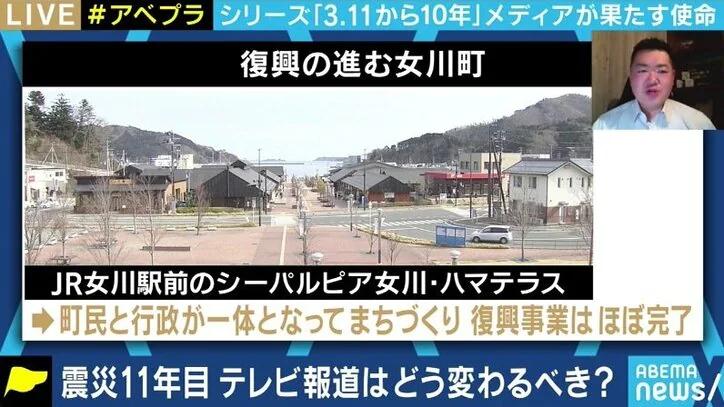Any TV worker who has seen the site of a major disaster once said, ``I will continue to report on this site for the rest of my life. I swear. However, most of them forget their thoughts as they are swept up in a series of different news stories.
However, there are also many TV people who do not forget such a vow and continue to go to the scene.
It will soon be 11 years since the Great East Japan Earthquake. I know many TV people who continue to carry out their "vows" faithfully even now. We asked these honest TV men about their current thoughts. What are the current “feelings and conflicts regarding 311 in the field of television reporting”? I want you to hear their voices.
Roughly summarizing, the voices of these "honest TV men" reveal the conflict between "the TV men who want to keep telling the story, and the upper management who don't want to go to the site". I think you will see ``11 years since the earthquake'' may be just the length of time that creates such a ``difference in enthusiasm among the TV crews within the station.''
I want to go to the site of the Great East Japan Earthquake, but I can't because of the new coronavirus. Such voices were heard from many TV people.

Like this photographer, "Recently, the company It seems that there are many TV people who feel that it is cold to report on the Great East Japan Earthquake.
Currently, the financial situation of TV stations is extremely difficult. The truth is that each station wants to spend as much of its program production budget as possible on dramas and variety shows during primetime. News programs are under tremendous pressure to cut budgets. I once heard an executive of a commercial broadcaster who was the same age as me say, ``At the moment, it's just barely enough to maintain news programs. .
However, it is very disappointing that the coverage of motivated TV people is hindered by the wall of "I can't get the audience rating". Moreover, I hope that the great people of the TV station will take this point and improve it, as almost all the TV people who responded this time have pointed out that point.
Every year around March 11th, each station broadcasts a special program for the Great East Japan Earthquake, and this year is no exception. However, as the voice introduced at the beginning said, ``This year will probably be reported around March 11, but the reality is that there is almost no coverage of the Great East Japan Earthquake other than that.'' And I don't pick it up at all in the other seasons." There are voices of doubts from TV people about "the way of 311 special program".
"For whom is the interview I think that the question "Is it true?" actually hits the essence of the disaster coverage on television. Once, when I went to the site to cover the Great Hanshin-Awaji Earthquake, I had a fight with the program desk, who was trying to put together a special feature with the content, "If this big earthquake had happened in Tokyo." When my boss in Tokyo told me, ``Even if you talk about Kobe locals too much, the viewers in Tokyo won't understand anything. despised the
Will you broadcast the current situation of the disaster area from the perspective of the people in the disaster area? Or will people outside the disaster area broadcast the disaster area "to learn lessons"? To put it bluntly, the current situation in the disaster area is, in a sense, "other people's affairs" for people outside the disaster area. Those of us involved in television reporting must continue to think about what kind of perspective to report there. A young reporter from a broadcasting station in the disaster area wrote the following.
However, I am convinced that the most important thing for disaster reporting on TV is for TV crews to continue to go to the scene and keep worrying about it.
[This article was jointly planned by the personal editorial department and the author, and was written by the author.]
